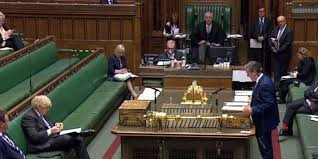The very people who most complain about lying politicians, seem to be the most inclined to believe their lies.
Trump’s supporters, in particular, went along with his slogan about ‘draining the swamp’. That suggested that it was Washington DC that was the breeding ground of all the ugliest and most dangerous lies. Now, since Trump has been in place, with a mandate of sorts to drain that swamp, he has massively raised the level of mendacious toxicity of the very swamp he occupies, which is clearly his most suitable habitat.
Hardly a day goes by without his coming up with some new lie. The latest was to nearly double the number of attendees at his Oklahoma rally, and to claim he was satisfied with the outcome, despite his obvious expression of crushed dejection.
 |
| Trump defeated by the poor turnout in Oklahoma Hope for us all in November |
Despite all that, some people keep on backing him. They swallow the lie.
The same is true in Britain.
In my view, Keir Starmer, as leader of the Opposition, had much the better of his exchanges in Parliament with the Prime Minister, Boris Johnson, at Prime Minister’s Questions (PMQs) on the 24 June. Above all, Starmer took the approach so many of us have demanded from our politicians for years or decades: calm, well-informed, moderate. He offered praise for where things had been done well in combating Coronavirus, and then focused on a genuine problem on which he called for clarity from the government.
 |
| Keir Starmer, on his feet, questioning Boris Johnson, left |
In other words, like the American voters who wanted the swamp drained, he rose to the challenge many UK voters have set politicians.
He asked:
Yesterday, the Government announced the next stage of easing lockdown restrictions. If that plan is to work—and we want it to work—we need an effective track, trace and isolate system. The Prime Minister promised that a world-beating system would be in place by 1 June. The latest figures from yesterday’s press conference hosted by the Prime Minister show that 33,000 people are estimated to have covid-19 in England. The latest track, trace and isolate figures show that just over 10,000 people with covid-19 were reached and asked to provide contact details. I recognise the hard work that has gone into this, but if two thirds of those with covid-19 are not being reached and asked to provide contact details, there is a big problem, isn’t there?
Did the Prime Minister respond in kind? Did he heck. Here’s what he said:
On the contrary. I think that the right hon. and learned Gentleman has been stunned by the success of the test and trace operation. Contrary to his prognostications of gloom, it has got up and running much faster than the doubters expected. They are getting it done—Dido Harding and her team have recruited 25,000 people and so far they have identified and contacted 87,000 people who have voluntarily agreed to self-isolate to stop the disease spreading.
In other words, he gave a purely old-style politician’s answer: on the attack, and dodging the question altogether. As Starmer pointed out:
The Prime Minister just has not addressed the question I put to him. I was not asking about those who have gone into the system—the 10,000—or those who have been contacted; I was asking about the two thirds of the 33,000 with covid-19 who were not reached. That is a big gap.
Clear, simple and focused on the key matter. If only 10,000 are being tested then, on the government’s own figures of 33,000 infected, two-thirds are not being reached. This is bad news. And Johnson’s response? He went back on the attack: “I hesitate,” he claimed without hesitation, “to accuse the right hon. and learned Gentleman of obscurantism. He is misleading on the key point.”
The accusation of misleading is serious in Parliamentary terms and the Speaker had to call on him to withdraw it.
The exchange moved on to the matter of the tracking app, promised for 1 June, then abandoned, now promised again, using commercial software, perhaps some time after September.
Boris Johnson was having no criticism on that front:
I wonder whether the right hon. and learned Gentleman can name a single country in the world that has a functional contract tracing app—there isn’t one.
Strangely enough, the right honourable and learned Gentleman Keir Starmer certainly could name one:
Germany. It had its app working on 15 June and it has had 12 million downloads—I checked that overnight.
So now the decks were cleared for Johnson to move from the lie circumstantial to the lie direct:
I am afraid that the right hon. and learned Gentleman is completely wrong, because no country in the world has a working contact tracing app.
Faced with a clear, verifiable fact, Johnson merely resorted to denial. A blatant, easily refuted lie.
And here’s the sad thing. He won’t be called on it.
Many have demanded that politicians find more honest ways of doing their job, for instance denouncing Blair for lying over Iraq.
They claim to want them more straightforward and thorough.
They called for less aggressive exchanges between them, more focused on solid, reliable information.
Yet a large number of them will rally to Johnson now. They will claim he bested Starmer. They’ll praise his style instead of denouncing his lies.
My only hope? That in neither the United Kingdom nor the United States will they constitute a majority.
So we really can drain the swamp and move to a healthier brand of politics.
No comments:
Post a Comment